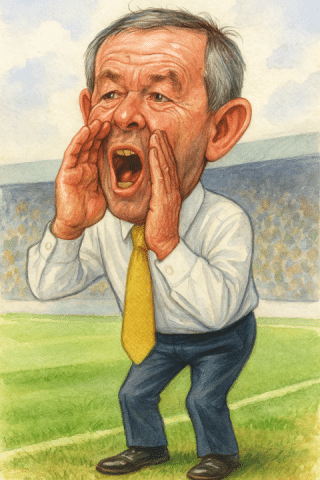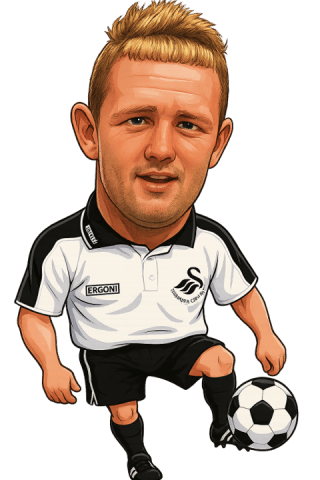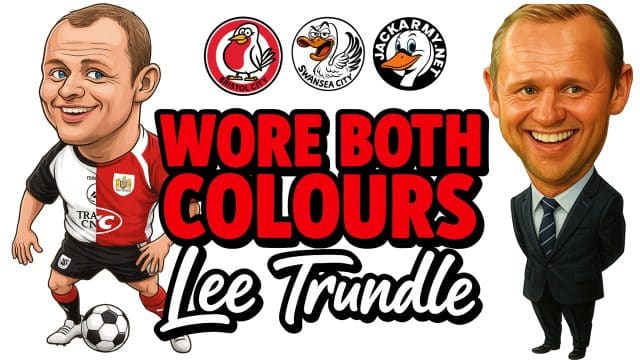The Wore Both Colours series has always been about more than just the names on a teamsheet. It is about the journeys, the rivalries, and the players who have straddled divides that mean so much to supporters. As Swansea City prepare to face Bristol City, there is one name that leaps off the page, a player who, in truth, never needed an introduction in these parts. Lee Trundle.
For Swansea fans, Trundle was not just a striker. He was a showman, a magician with a ball at his feet, and a symbol of a club rediscovering its identity in the early 2000s. His tricks and flicks were not simply party pieces. They were moments that lifted a city, broadcast to the nation on Sky Sports’ Soccer AM, and etched into the memory of anyone who watched him in full flow.
Trundle’s story is more than highlight reels. It is a tale of late bloom, of non‑league graft before the glamour, of a career that took him from Wrexham to Swansea, and eventually across the River Severn to Bristol City. Along the way came promotions, cup finals, heartbreaks, and the kind of cult status that few players ever achieve.
This is the latest chapter in our Wore Both Colours series, the journey of Lee Trundle, the man who lit up Swansea, tested himself at Bristol, and remains, to this day, one of the most beloved figures at Swansea City.
🧒 The Early Years
Lee Christopher Trundle was born on 10 October 1976 in Liverpool, England, and grew up in Huyton, an area steeped in football culture. Like so many youngsters from Merseyside, his first experiences of the game came not in academies or structured coaching sessions but on the streets, where flair and imagination were as important as discipline.
Unlike many of his contemporaries who were snapped up by professional clubs in their early teens, Trundle’s path was slower, more organic. He played junior football locally, honing the tricks and skills that would later become his trademark. Those early years were about expression, about learning the game in its rawest form, and about developing the confidence to try things others would not dare.
This grounding in street football and local youth sides gave Trundle a distinctive edge. He was not a product of a rigid academy system but of a culture that valued individuality. That individuality would carry him through the non‑league ranks and eventually into the professional game, but it all began in Liverpool, where a boy with a ball at his feet started to dream.
🏟️ The Non‑League Rise
Trundle’s path into the professional game was anything but conventional. After his youth football in Liverpool, he drifted into the non‑league scene, where his flair and eye for goal began to catch attention. He first played for Burscough before moving on to Chorley, Stalybridge Celtic, Southport, and Bamber Bridge. Each stop was another proving ground, another chance to show that his street‑football instincts could thrive against hardened semi‑professionals.
It was at Bamber Bridge in particular that Trundle began to stand out. His ability to conjure goals from nothing and entertain crowds with audacious skill moves marked him as different. A move to Rhyl in Wales followed, where his reputation grew further.
These years were vital. They gave Trundle resilience, a grounding in the physical side of the game, and the confidence to keep pushing despite being outside the professional spotlight. By the time Wrexham came calling, he was no raw youngster but a seasoned non‑league forward ready to seize his chance.
🔴 Wrexham
Lee Trundle’s break into the Football League came in February 2001 when Brian Flynn, then manager of Wrexham, signed him from Welsh club Rhyl for a fee of £50,000. At 24 years old, it was a late start by professional standards, but Trundle arrived with the confidence and flair honed in non‑league football.
Trundle quickly proved Flynn right. His debut season in Division Three showed he could handle the pace and physicality of league football. He scored goals, but more importantly, he entertained. His trademark flicks, volleys, and long‑range efforts gave Wrexham fans something different, a showman who could turn a match with a moment of brilliance.
The following season, under new manager Denis Smith, Trundle’s influence grew further. In 2002–03, he scored 9 league goals and played a key role in helping Wrexham secure promotion to Division Two. His partnership with Andy Morrell was particularly effective, combining Morrell’s relentless finishing with Trundle’s creativity and flair.
By the time he left Wrexham in the summer of 2003, Trundle had made 94 league appearances and scored 27 goals. More than the numbers, though, he had established himself as a cult figure. Wrexham was the launchpad, the place where Brian Flynn’s faith gave him his first real chance, and where the showman from Liverpool proved he belonged in the Football League.
🦢 Swansea City
When Swansea City signed Lee Trundle on 8 July 2003, it was Brian Flynn who made the call. Having already given Trundle his break at Wrexham, Flynn knew exactly what he was getting: a goalscorer with flair, charisma, and the ability to lift a team. The deal was a free transfer, but its impact was priceless.
Trundle announced himself immediately. He scored on his debut in a 4–2 win over Bury and followed it up with a hat‑trick against Cheltenham. From that moment, the Jack Army knew they had something special. His tricks and audacious skills quickly became a staple on Sky Sports’ Soccer AM, where he was a regular in the “Showboat” segment.
Over four seasons, Trundle delivered both goals and unforgettable moments. In 2004–05, he scored 23 goals, firing Swansea to promotion from League Two. In 2006, he produced one of his most famous strikes, a stunning volley at the Millennium Stadium as Swansea beat Carlisle to lift the Football League Trophy. Yet there was heartbreak too, as Swansea lost the League One play‑off final to Barnsley on penalties that same year.
By the time he left for Bristol City in 2007, Trundle had scored 78 goals in 146 appearances. More than the numbers, he had become the face of Swansea’s revival, a player who brought joy back to the Vetch and then the Swansea.com Stadium. His name remains synonymous with Swansea City, not just for the goals but for the swagger, the tricks, and the bond he forged with supporters.
🐦 Bristol City
In the summer of 2007, Lee Trundle made the move across the River Severn to Bristol City. The fee was reported at £1 million, a record signing for the Robins at the time, and a clear statement of intent from manager Gary Johnson. For Trundle, it was the chance to test himself at a higher level, stepping into the Championship after years of dazzling in the lower leagues.
His time at Ashton Gate never quite reached the heights of his Swansea years, but it was far from insignificant. Trundle contributed with goals and flashes of his trademark flair, and Bristol City enjoyed a remarkable campaign in 2007–08, finishing fourth in the Championship. That run took them all the way to the play‑off final at Wembley, where they faced Hull City. Promotion to the Premier League was within touching distance, but Dean Windass’s stunning volley denied them, and Trundle’s dream of reaching the top flight slipped away.
Across two seasons, Trundle made 53 league appearances and scored 7 goals for Bristol City. While he was not the talisman he had been in Swansea, he remained a popular figure, admired for his effort and character. The move gave him the chance to prove himself at a higher level, and though the Premier League eluded him, his spell at Bristol added another chapter to a career built on resilience and charisma.
⏳ The Final Years
After two seasons at Bristol City, Trundle found himself seeking more regular football. In January 2009, he joined Leeds United on loan, making 10 appearances and scoring once. It was a short spell, but it gave him a taste of Elland Road and the pressure of a club chasing promotion. Later that year, he returned to familiar surroundings with a loan move back to Swansea City. Though no longer the talisman of old, his presence alone stirred the Jack Army. He featured in the 2009–10 Championship campaign, making 20 league appearances and scoring 5 goals as Swansea flirted with the play‑offs under Paulo Sousa.
By the summer of 2010, Trundle’s time at Bristol City had come to an end. He signed for Neath in the Welsh Premier League, where he scored prolifically. In 2012, he joined Preston North End, but opportunities were limited. His spell at Deepdale was brief, with just 1 league appearance before being released in 2013. It marked the end of his professional league career, closing a chapter that had begun so late but burned so brightly.
 At 35, Trundle had squeezed every drop from a professional journey that began late but burned brightly. The loans at Leeds and Swansea showed his enduring appeal, while Preston marked the end of his league chapter. What remained was a legacy built on flair, charisma, and the ability to make supporters believe in magic.
At 35, Trundle had squeezed every drop from a professional journey that began late but burned brightly. The loans at Leeds and Swansea showed his enduring appeal, while Preston marked the end of his league chapter. What remained was a legacy built on flair, charisma, and the ability to make supporters believe in magic.
🌍 Playing Locally
When his Football League career ended, Trundle did not hang up his boots. Instead, he returned to the grassroots game in Wales, where his love for football and his flair could still light up pitches. He played for Neath, then later became prolific at Llanelli Town (2016–18, 68 goals in 45 apps). From there, he featured for Haverfordwest County (2018), and then Ammanford AFC (2019–23, 29 goals in 63 apps). In 2023, he joined Trefelin BGC in Cymru South, still entertaining crowds well into his forties.
Even as the years rolled on, Trundle’s appetite for the game never dimmed. Crowds would still gather to watch the tricks and audacious finishes that had once graced the Swansea.com Stadium. Whether in front of thousands or a few hundred, he remained the same showman, still capable of producing moments that made supporters smile.
🦢 A Swansea Legend
Even after stepping away from the professional game, Lee Trundle’s bond with Swansea City only grew stronger. Today, he serves as a club ambassador, representing the Swans at matchdays, community events, and charity initiatives. His role keeps him close to the supporters who adored him during his playing days, and he remains one of the most recognisable faces associated with the club.
Trundle’s work extends far beyond the pitch. He is heavily involved in charity fundraising, regularly appearing at events across South Wales to support local causes. His willingness to give back reflects the same charisma and warmth that made him a fan favourite. Whether it is meeting supporters at the Swansea.com Stadium, coaching youngsters, or lending his profile to community projects, Trundle embodies the values of Swansea City.
For the Jack Army, seeing Trundle on matchdays is a reminder of an era when the club rediscovered its pride and identity. His tricks and goals may belong to the past, but his presence continues to inspire. Few players have managed to maintain such enduring popularity, and fewer still have embraced the responsibility of being a figurehead with such enthusiasm.
Lee Trundle remains, to this day, not just a former player but a living symbol of Swansea City’s spirit.
 📝 LT10 – A Swansea Legend
📝 LT10 – A Swansea Legend
Lee Trundle’s career is a story of late beginnings, audacious talent, and enduring connection. From the streets of Liverpool to the non‑league grind, he carved out a path that defied convention. Brian Flynn gave him his first break at Wrexham, and from there Trundle never looked back. His flair, his charisma, and his knack for the spectacular made him a cult hero in North Wales, but it was at Swansea City where he became a legend.
The free transfer in 2003 changed the trajectory of both player and club. Trundle’s goals, his tricks, and his swagger embodied Swansea’s resurgence. Promotions, cup finals, heartbreaks, he was at the centre of it all, a player who made supporters believe in magic. His move to Bristol City brought him close to the Premier League, and though that dream slipped away at Wembley, his reputation as a showman remained intact.
Even as his league career wound down with loans to Leeds and Swansea, and a final spell at Preston, Trundle’s love for the game never faded. He carried on in Welsh football, still entertaining crowds well into his forties. Today, as a club ambassador at the Swansea.com Stadium, he continues to inspire, giving back to the community and reminding fans of an era when joy returned to the terraces.
Lee Trundle was never just about goals. He was about moments, anticipation, and the sheer thrill of football. His legacy is not measured in statistics alone but in the smiles he brought, the pride he restored, and the bond he forged with the Jack Army. A true Swansea legend.

This article first appeared on JACKARMY.net.

